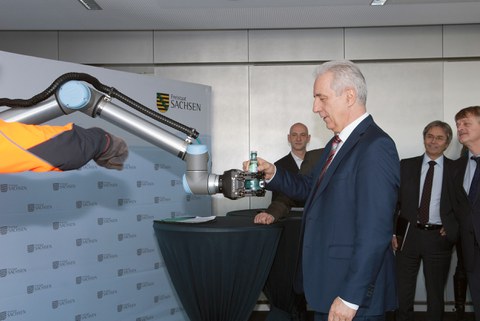Jan 10, 2017
TUD’s scientific expertise for the implementation of the hub-concept
Digital Hubs are a new form of “digital ecosystems” designed to promote the co-operation between start-ups, established companies and the scientific community in order to strategically boost digital transformation.
In November 2016, the first Digital Hubs were presented at the national IT-summit. In 2017, Dresden is striving to be included in the group of a total of twelve planned Digital Hubs with its “Smart Systems Hub – Enabling IoT” (IoT – Internet of Things) and thus be able to provide access to this Future Initiative to the entire Free State of Saxony with all its technological strength. The state government will sustainably support this endeavour.
It is envisaged that Dresden shall focus on the topic “Smart Systems Hub – Enabling IoT”. The goal is to further develop the digital industries of the future and to make a decisive contribution to the digitalisation of Germany’s leading industries. For this purpose, competences in hardware, software and connectivity are bundled in order to create intelligent systems for the era of digital industries. Saxony provides great opportunities to elevate its expertise in mechanical engineering, automotive construction, semiconductor technology and microelectronics to the next generation through the targeted application of software and IT developments, and thus to define and create new markets. The areas of application are as diverse as Industry 4.0, Connected Car, Electro-mobility and cyber-physical systems for smart products, cities and infrastructures.
TU Dresden makes the crucial scientific contribution through its proven expertise in the fields of Big Data, Internet of Things, high-performance computing, software development for robots and cyber-physical systems as well as Tactile Internet with 5G-technology. The TUD professors Uwe Aßmann, Gerhard Fettweis, Frank Fitzek and Wolfgang E. Nagel play a leading role in the preparations for the “Smart Systems Hub”. “Through the strategic development of the Lehmann Centre as a gateway to TU Dresden’s methods and software competences, we have successfully created ideal conditions for setting up the DLR-software-institute and the Digital Hub”, states Prof. Wolfgang E. Nagel, Director of TUD’s Centre for Information Services and High Performance Computing. “The pooling of expertise under one roof – in one building – will sustainably lead to new added-value chains in the future and will strengthen the attractiveness of Saxony as a prime science location.”
Prof. Uwe Aßmann, Dean of TUD’s Faculty of Computer Sciences adds: “The Smart Systems Hubs is Dresden’s window on the world. Dresden supplies the world with technology platforms for the Internet of Things, not only the microelectronics, but also the software and connectivity platforms. These Dresden-based platforms help numerous partners worldwide to design and efficiently implement innovative services and product-ecosystems for the Internet of Things. Investors from all over the world are able to find partners in the Dresden Smart Systems Hub to catalyse their innovations, which is an important contribution to the future prosperity of Saxony.”
Prof. Frank Fitzek elaborates: “Through the close interconnection between hardware and software with connectivity – from Tactile Internet to 5G-technology – it is now possible to develop entirely novel and versatile products, which serve as energy-efficient basis modules for further product lines.”
The Faculties of Electrical and Computer Engineering and Computer Science as well as the Lehmann Centre are high-performing and strong in third-party funding and collaborate closely with the adjacent industries and businesses, supported by excellent research and development in material sciences. Prime examples are the successful acquisitions of the Collaborative Research Centre HAEC – Highly Adaptive Energy-efficient Computing and of the Cluster of Excellence cfaed (Center for Advancing Electronics Dresden). Furthermore, the establishment of the Lehmann Centre is an organisational and structural flanking measure for the plethora of other research activities at TU Dresden, which aim at driving high-technology forward.
Since it was announced a few weeks ago that a DLR-software institute (DLR – German Aerospace Center) will be established at TU Dresden, the preparation of the “Smart Systems Hub” once again underlines TU Dresden’s excellence in the area of digitalisation. The DLR institute will smoothly be embedded in the “Smart Systems Hub” and synergetically profit from the joint activities.
Media Inquiries:
Prof. Wolfgang E. Nagel
Tel.: +49 (0) 351 463-35450

